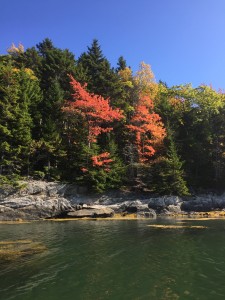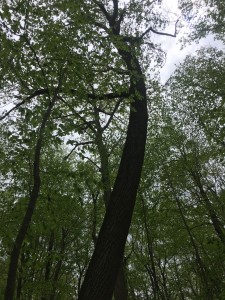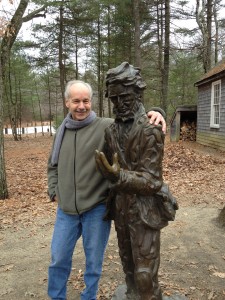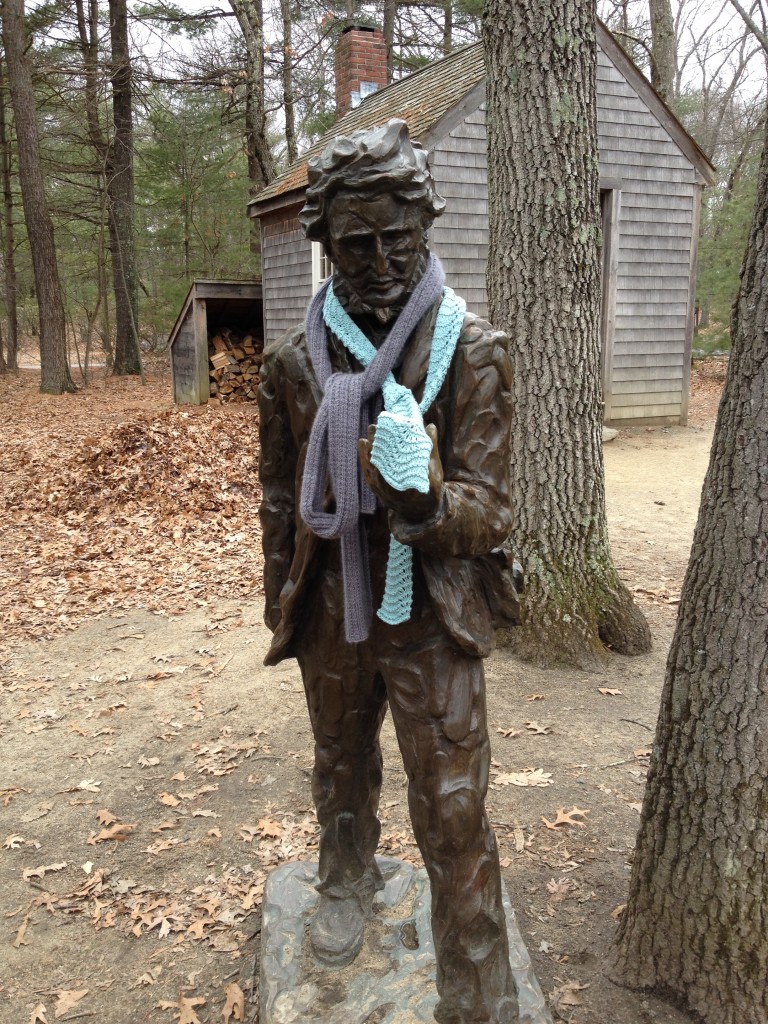Editor’s note: Thoreau and the Language of Trees is a new book by Concord author Richard Higgins.
By Sandy Stott
As I begin this book, a patient presence of white and pitch pines stands ten or so feet from my open window. One, a pitch pine, has died, though its trunk rises still to 30 feet, and it has become a lure for a pileated woodpecker whose exploratory peckings offer a braille I run my hands over, even as their poetry eludes me. The other 42 trees of this small, yard-girt woodland vie for light, for sky, and they stir whenever the wind blows. Tonight though, they wait, stilled in the late light of this summer’s solstice. Perhaps the owl who called from them a few nights ago will visit all of us later. They are of my yard; all will outlive me; even the pileated-stippled pitch pine trunk may endure decades. Making the acquaintance of these trees takes me beyond myself.
****
When I taught parts of Thoreau’s work to the sometimes hurried young, I had a favorite moment in the semester: some weeks of reading into the term, and some minutes into a class, I closed Walden and asked simply, “are you ready?” Most said, yes; a few demurred: “um…for what?” they asked. “Let’s go,” I said, and they followed me out from the rectangular classroom, down the stairs and to the door. Once outside, I offered them a choice — find any natural object, get comfortable, and concentrate on it (and only it) for ten minutes. I’ll let you know when time’s up.
Most often people picked trees. I would watch them watch their trees. Some lay on their backs and looked at the canopied sky; other stood at mimicked angle a few feet from the tree; a good number climbed into a tree of choice and sat or stretched out upon a limb. A few got inches away from the trunk or a twig. For an age group often slandered for their rabbity attention, they had remarkably little trouble “getting lost” in their trees. When I read their findings later, I realized that some of them had remained with the tree for paragraphs well after I’d summoned them back into the usual school world of call and response.
I knew, of course, of Thoreau’s fondness for and scrupulous attention to trees. What I didn’t know was that as I was working with the rudiments of this tree-teaching, Richard Higgins was afoot in nearby Concord and in the pages of Thoreau’s journal making a much deeper study. Would that I had been able to bring Higgins and his tree-findings to help my classes toward their trees.
That is, I realize, a rather lengthy preamble to what I mean to be a praise-song for Higgins’s new book, Thoreau and the Language of Trees, but I have taken a personal route to praise because this attractive, compact volume has touched me. Three presences are prominent in its pages — Thoreau, Higgins and a cast of character-trees too numerous to name. Higgins shapes his short essays at the outset of each chapter with an appealing clarity, using them to introduce small groves of short readings from Thoreau. The trees rise from their words. And they rise also in a generous offering of illustrations — photographs (many by Higgins) and, familiar to readers of Thoreau’s journals, a scattering of his quick sketches.
Here is an excerpt that perhaps offers enough window into Higgins’s book for you to see your way there:
Trees brought out another side to Thoreau, one we rarely hear about. They stirred a boyish joy in him. He found “an inexpressible happiness” in the woods. “Their mirth is but just repressed.” Lichen lifted his spirits, and trees seen from a mountain delighted him: “Nothing is so beautiful as the tree tops. A pine or two with a dash of vapor in the sky—and our elysium is made.” (p. 36)
When work has confined me, boxed me into its rectangles, I’ve always pointed to the reward of a next woods-walk as part of what sustained that work. But what Thoreau and his modern companion Higgins have done is to enrich my relations with trees, to sharpen my eye, broaden my heart and encourage my narrative impulse to include my patient neighbors. Who may or may not — who knows? — be patient with me.
I return to the page. Here, deep in the book, I’ve found that Robert Richardson’s first sentence in the Forward rings true: “There is real magic in this book.”
I look out at my 42 friends a few feet away. So many stories. Now, it is time to go out.




